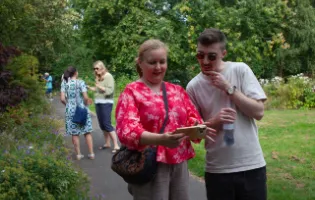Dr. Cann presenting "An AI view of media coverage of climate"
Created on: May 1, 2024
Tristan Cann is presenting an "An AI view of media covering climate change" at Pint of Science in Exeter on 15 May. He will share some of the ways that AI can be used to understand this space and highlight ways we can recognise the effectiveness of these messages. You can sign up to attend Tristan's talk by clicking the "Read More" link below.
Many newspaper articles, TV shows and social media posts discuss climate change and promote many different views. In this talk, I will share some of the ways that AI can be used to understand this space and highlight ways we can recognise the effectiveness of these messages. We’ll see how social media interactions can shed light on levels of polarisation in engagement with climate change media, how the technology behind ChatGPT can reveal the ‘echo’ of attempts to influence attitudes and how we can efficiently identify patterns in thousands of images in media coverage.
C3DS AI powers new CCDH study on climate misinformation
Created on: Jan. 16, 2024
A new report released by the Center for Countering Digital Hate (CCDH) uses an AI model developed by C3DS researchers to study misinformation on social media. The model was originally developed by Travis Coan, Mirjam Nanko (C3DS), Constantine Boussalis (Trinity College Dublin), and John Cook (University of Melbourne). The report, entitled "The New Climate Denial", documents a shift in towards undermining climate solutions.
C3DS researchers win knowledge exchange award
Created on: Oct. 26, 2023
C3DS Deputy Director Chico Camargo and Research Associate Ranadheer Malla won Bright Futures Award for Early Career Research Impact at the University of Exeter Knowledge Exchange Awards for their “YouTube Regrets Project”. Chico and Ranadheer partnered with the Mozilla Foundation to develop a pioneering set of projects designed to scrutinize and gather evidence on the harmful and dangerous nature of YouTube recommendations.
The YouTube Regrets project is part of a pioneering set of projects designed to scrutinize and gather evidence on the harmful and dangerous nature of YouTube recommendations. Working with 37,380 users, the team analysed tens of thousands of videos which, though recommended by YouTube’s algorithm, viewers regretted watching or being recommended to. This crowdsourced investigation used Mozilla’s Regrets Reporter, a browser extension for volunteers to report their ‘regrets’. Chico Camargo coordinated a team of 41 student research assistants to analyse these regretted videos, finding that these YouTube recommendations are often harmful and misinformative, and that non-English speaking countries are hit the hardest.
Prof. O’Neill leads workshop on ‘Seeing the city through a climate lens’
Created on: Sept. 8, 2023
Prof. O’Neill, together with WellImage CIC founder, photographer Vanessa Miles, ran a session on ‘Seeing the city through a climate lens’ as part of the British Science Festival. The session included a seminar and guided photography walk through Exeter city centre. Participants were challenged to view the city in a new way, and to create photographs which might re-envision how we might cope, adapt, and flourish in a climate-changed future.
How can we start to capture and communicate the local effects of climate change through images? Images are everywhere. Beyond capturing memories or helping to explain concepts, they can be vivid and emotive tools, drawing us in to a topic. They also play a key role in the media, communicating beyond words and shaping how we think. Yet, despite their importance, photography and imagery don’t tend to get the recognition they deserve. Often relegated to the role of background ‘wallpaper’, images are often given little thought by researchers or journalists. This was a session run by Saffron O’Neill, together with her PhD students Ned Westwood, Sylvia Hayes, Veronica White and Ollie Blewett; alongside WellImage CIC founder, photographer Vanessa Miles. Together, they ran a seminar and guided photography walk through Exeter city centre. They challenged participants to view the city in a new way, and to create photographs which might re-envision how we might cope, adapt, and flourish in a climate-changed future.
C3DS researcher wins the Walter Lippmann Best Article of the Year Award
Created on: July 2, 2022
C3DS Director Travis Coan, with co-authors Constantine Boussalis (Trinty College Dublin), Mirya Holman (University of Houston), and Stefan Müller (University College Dublin), won Walter Lippmann Best Article of the Year Award for their article on ““Gender, candidate emotional expression, and voter reactions during televised debates", published in the American Political Science Review. The award recognises the best paper published in the field of political communication.
C3DS Director Travis Coan, with co-authors Constantine Boussalis (Trinty College Dublin), Mirya Holman (University of Houston), and Stefan Müller (University College Dublin), won Walter Lippmann Best Article of the Year Award for their article on “Gender, candidate emotional expression, and voter reactions during televised debates". This study explores how male and female politicians use their facial expressions and voices to convey emotions to voters during televised debates, while also being influenced by gender roles. They analysed videos of five German debates and found that female politicians, like Angela Merkel and women from minor parties, exhibit less anger but convey emotions similarly to male counterparts. Interestingly, voters reward women's expressions of happiness and penalize their displays of anger. The study was published in the American Political Science Review.




